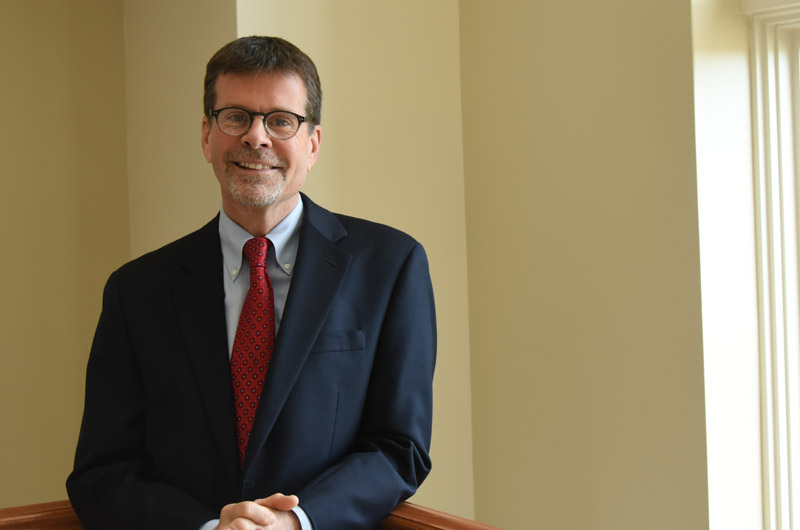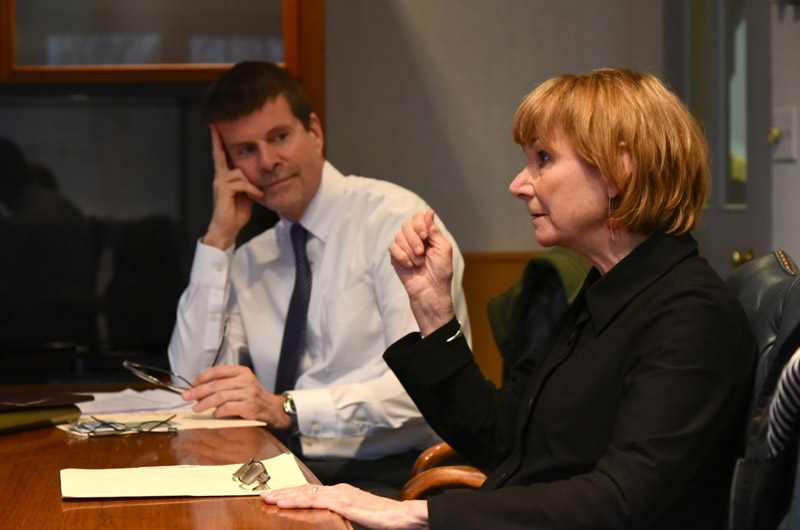The Martha’s Vineyard Hospital board of trustees scrambled to contain the damage this week following the abrupt ouster of hospital president and chief executive officer Joseph Woodin after just 13 months.
Mr. Woodin was fired early Monday morning, triggering a public outcry amid conflicting versions about what happened. Hospital leaders have remained tight-lipped about the specific reasons for the firing, citing only differences with the board. Mr. Woodin said he was blindsided and characterized events as a power play by the board chairman Timothy Sweet.
In a press release that went out Monday morning, Mr. Sweet said Mr. Woodin was “stepping down” from his role. The release gave no reason or time frame for Mr. Woodin’s departure, but said that former president and chief executive officer Timothy Walsh would return as interim CEO while a search begins for a new administrator.
Mr. Woodin said he had been fired.
“I just got summarily fired at 8 a.m. with no notice and no discussion of anything I’ve done wrong — by the board chairman,” he told the Gazette.
At the time Mr. Sweet had little comment. He said Mr. Woodin’s departure was the result of a board decision, although he could not say if there had been a vote. “I would rather not get into the process right now,” he said. But Mr. Woodin, a longtime hospital executive in rural Vermont who was hired last year to take the helm at the Island’s only hospital after a nationwide search, did not mince words. He said he had been asked without warning on Monday by Mr. Sweet to sign an agreement saying he was resigning for personal reasons — and he refused.
“I’m not resigning. I love this job. I just bought a house,” Mr. Woodin said.
“This is the worst of Island politics and this is between the board chairman and me,” he continued. “Apparently I have crossed him, although I have always respected him. I was speechless. There have been no performance reviews given to me, no documentation, no phone calls, not a single concern over my performance.”
Mr. Woodin, 56, was named in February 2016 to replace Mr. Walsh, who was retiring after 16 years. He started work last May.
He came to Martha’s Vineyard from Gifford Medical Center, a critical access hospital in central Vermont, where he had been president and CEO since 2000. He previously held key positions at Fletcher Allen Health Care, formerly the Medical Center Hospital of Vermont.
Trained as an industrial engineer, he began work in business and manufacturing but early on in his career moved into hospital administration in Vermont, spurred initially by his work in a homeless shelter in Burlington, Vt.

At the time of his appointment, Mr. Sweet, the board chairman who also led the search committee, said Mr. Woodin almost immediately rose to the top of the candidate list. “He quite frankly seemed to be custom made for exactly what we were looking for,” he said.
The Monday ouster this week touched off a small avalanche of community comment, most expressing shock and calls for more information; at press time Thursday nearly 150 comments had been posted on the Gazette website reacting to the news.
On Wednesday morning the hospital board called an emergency meeting where a formal vote was taken to terminate Mr. Woodin.
In a joint phone interview Wednesday afternoon, hospital board chairman Timothy Sweet and vice chairman Edward Miller said all but one of board’s 15 trustees participated in the meeting. The vote was nearly unanimous, they said, with one dissenting party that they did not name. The two board leaders spoke in guarded terms, repeatedly citing confidentiality concerns but describing a growing rift between the CEO and the board. “Joe had lost the confidence of the board,” Mr. Sweet said. “And that was a culmination of multiple reasons. What I need to be clear about — and for Joe’s sake — is that there was no malfeasance. Joe was professional and honorable and I want to leave it there.” He continued:
“Losing the confidence of the board is something you can’t get back. It really is a matter of trusted judgment. We were starting to go in different directions about what we thought was right for the future. In essence it was about how the hospital should govern itself. To his credit Joe took issues and ran with it. But there may have been a difference of opinion about where ultimate authority lies . . . It got more difficult about where final decisions should rest.”
Mr. Sweet also said Mr. Woodin had recently asked for a raise, which triggered an internal review.“And out of that process concerns arose,” he said.
He confirmed that Mr. Woodin had a five-year contract, but declined to specify the salary amount.
The two board members also sought to clarify how the termination was handled.
Mr. Sweet said there had not been a formal vote of the trustees before action was taken on Monday. “It was a board decision. Board members had been polled, there was not a formal vote . . . . to give Joe a chance to step down. When things went differently . . . we had to have a confirmatory vote to terminate him,” he said, adding:
“What happened was a very messy fallout and we feel heartsick about it. The error is ours — it never occurred to us that he wouldn’t take the opportunity to do what is best — that’s why there were mixed messages and for that we apologize.”
In a prepared statement issued Wednesday to both Island newspapers, Mr. Sweet made it clear that the ultimate responsibility for the hospital rests with the board. “Making difficult — sometimes unpopular — decisions is part of the role we have accepted,” he wrote. The full statement is published on the Gazette website.
Meanwhile, the two board leaders confirmed that former CEO Tim Walsh had come out of retirement to step in as interim CEO at the hospital. They said an immediate search would begin for a new president and chief executive officer at the Island’s only hospital.
There are 15 trustees on the hospital board, including Mr. Sweet, Mr. Miller, Mr. Woodin and Dr. Pieter Pil, the chief medical officer. The board also includes the general counsel for the ultimate owner of the hospital, Partners HealthCare, Brent L. Henry. Other members are: Earle A. Ray, (treasurer), Mary R. Brown, (secretary), Debra A. Burke, Susan C. Crampton, Dr. Michael R. Jaff, A. Anthony James, Ronald H. Rappaport, John H. Schaefer, Warren J. Spector, and Walter S. Teller. Mr. Sweet said all but Dr. Jaff, president of Newton-Wellesley Hospital, participated in the meeting Wednesday.
Formerly independent, the Martha’s Vineyard Hospital was acquired in 2006 by Partners, which owns several large hospitals in Boston and smaller affiliate hospitals in Massachusetts, of which the Vineyard is one. The Island hospital’s parent company is technically Massachusetts General Hospital, whose parent company is Partners.
Anthony James, MGH senior vice president for network development and integration, who is also one of five Partners representatives who sits on the Vineyard hospital board, said the affiliate boards reflect a Partners company philosophy of community input and local control.
He said trustees are limited to three three-years terms, but there had been no term limits for officers until recently when hospital bylaws were changed. Mr. Sweet and Mr. Ray have been on the board since 1997. Ms. Brown has been on since 2003 and Mr. Miller has been on since 2004.
Beginning next year, Mr. James said, every board member will be subject to the three-term limit, and current officers will begin to leave the board in a staggered fashion until 2021, beginning with the secretary and followed by the treasurer, vice chairman and chairman. The changed policy allows for the new chairman to serve an additional three-year term, he said.
Commenting briefly on the ouster of Mr. Woodin, Mr. James said: “I think we all think this is an unfortunate series of events. In hindsight you can always say how can you do these things in a better way . . . but what we saw was a lack of alignment in terms of the vision of the board and how that was being interpreted and executed by the CEO.” He concluded: “These things happen — and I think we all recognize that in these cases it becomes a very difficult process and we certainly saw that this week.”









Comments (49)
Comments
Comment policy »